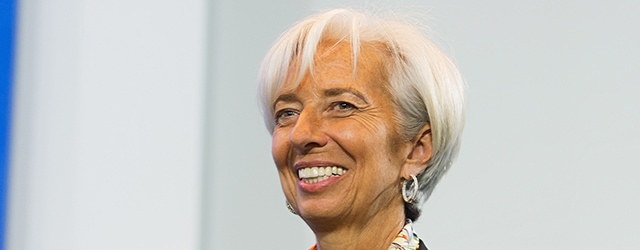Growth slowed down since January but will rebound from late 2019 as central banks take a patient approach to monetary tightening and China boosts its economy, the IMF chief says.

The global economy is unlikely to fall into a recession this year despite slowing growthamid trade tensions and tighter financial conditions, the International Monetary Fund (IMF) managing director Christine Lagarde said.
Central banks’ “patient” approach to monetary tightening and China’s stimulus are expected to boost global economic output from late 2019 into next year after a disappointing first half of 2019, Lagarde said in a speech ahead of the IMF and the World Bank’s spring meetings next week in Washington, D.C.
“Six months ago, I pointed to clouds of risk on the horizon. Today, the weather is increasingly ‘unsettled’,” Lagarde said in remarks as prepared for delivery at the US Chamber of Commerce.
The IMF in January projected global growth at around 3.5% for 2019 and 2020, a drop from 3.7% in 2018 and the previous 3.7% forecast for this year.
The economy “has since lost further momentum, as you will see from our updated forecast next week,” Lagarde said. The Washington-based institution will release its updated World Economic Outlook on April 9.
The IMF estimates that 70% of the global economy will suffer a slowdown this year, compared to 75% experiencing an upswing only two years ago.
“But, to be clear, we do not see a recession in the near term. In fact, we expect some pickup in growth in the second half of 2019 and into 2020,” Lagarde says.
“Global economic activity is set to benefit from the now more-patient pace of monetary normalization by major central banks—led by the US Fed—and from increased stimulus, in China for example,” the IMF chief explained. As a result of these policy actions, financial conditions have eased and capital flows to emerging markets increased, she said.
China has announced plans to boost spending, attract foreign investment and cut taxes to boost its slowing economy as it deals with trade negotiations with the United States.
Downside risks for the global economy include uncertainty around the UK’s withdrawal from the EU, spillovers from high-debt countries, trade barriers and unease in financial markets.
Such a delicate moment for the global economy demands “right” policy steps, including an accommodative monetary policy where inflation is below target, rate flexibility to absorb shocks, and a stronger financial sector to reduce stability risks, Lagarde said.
“The reality is that many economies are not resilient enough. High public debt and low interest rates have left limited room to act when the next downturn comes, which inevitably it will,” she said.
Concentration of market power by a few large corporate groups is also a concern for the IMF, which estimates that higher markups have a very limited impact on investment, output and labor income.
The highest price markups are in the hands of a few technology giants, according to a new IMF study. Although Lagarde doesn’t believe such dominance constitutes a monopoly problem, she called for reducing barriers to entry for new firms and reforming competition rules.
The managing director called for removing distortions in the trade system, including by modernizing the World Trade Organization, and steering clear of trade tariffs.
The IMF estimates that a 25 percentage-point increase in tariffs on all goods traded between China and the US would reduceUS annual GDP by 0.6% and China’s economic output by 1.5%.
“These are potentially self-inflicted wounds that should be avoided,” Lagarde said.
Other topics on the agenda of global policymakers coming to Washington, D.C. next week include international corporate taxation, climate change and corruption.
The annual cost of bribery alone is over $1.5 trillion—approximately 2% of global GDP.According to a new IMF study, within a group of similar economies, less corruption drives tax revenues higher, with a gap of up to 4% of GDP between countries.



